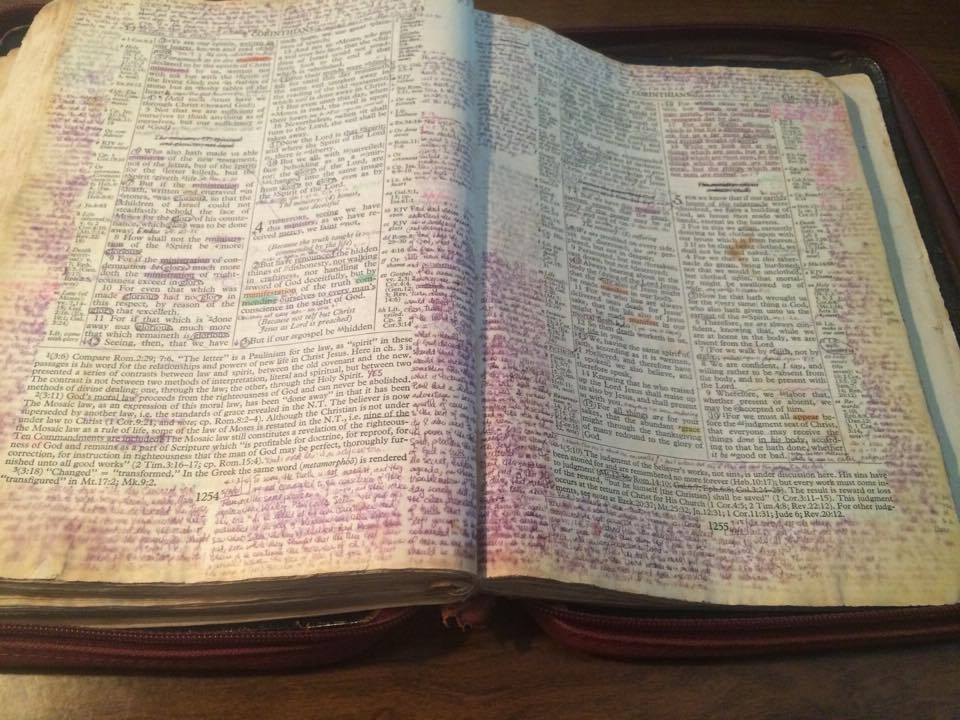I’ve made references to my Bible journaling in a few of my posts through the years, primarily here and here and here. I even blogged about it for Desiring God. But recently I came across this story written in March of 2000., sixteen years ago.
***
It was on the choir tour bus during my junior year of college that a young man I greatly admired challenged me about my devotional life.
“I don’t think it’s right,” he said, “to read the Bible just looking for one verse that sticks out for the day, for a shot in the arm, a spiritual vitamin pill. The Bible is God’s revelation to man, and we should read it that way. We should search the Scriptures simply to see what He has to show us—in context.”
I hope this sounds like old news to you, but to me it was a revolutionary thought. I had read the Bible through several times, but I always read just looking for those “good” verses, quickly skimming over what I didn’t understand or didn’t think applied directly to me.
But that conversation marked the point when I decided to seriously try to understand the Word of God. I immediately laid my plan of action and requested a wide-margin Bible (“with wide margins all the way around the page”) for my upcoming birthday. This began a Scripture study method that has served me well for over twenty years, for both reading and studying.
I began by simply reading the Bible with fine-point pen in hand, writing in tiny cursive in the margin any cross-references that occurred to me, observations, and comments or questions about passages.
But also, because I was so conscious of the passing of my life, I wrote the date above every comment. So, when I wrote “I know just how David must have felt,” I can look at the date now, twenty years later, and remember what I was going through at the time.
After several years of making notes as I read through the Bible, I decided to do some in-depth study this same way. Then I went more slowly, filling up margins with observations such as what words meant, quotes from commentators, what the author’s point was, an outline of the book, and eventually even notes like “I have more on this in the computer.”
At the end of each book I would write my list with a heading something like, “Still Unanswered Questions about Hebrews,” with the date, of course.
Periodically I look through those lists again, hoping maybe some new insight has come to me. How glad I am to find that through a sermon or a conversation with my husband or a book I’ve read, I now understand a statement in Scripture that I didn’t understand several years ago.
Underneath remarks like “Augh! I need help with this parable!” or “What in the world does being ‘baptized into Moses’ mean?” I can now write, “I understand this!” And I answer my question. And of course I date the answer.
And I see a little more of the Plan of God unfolding before my eyes.
Sometimes, over the years, I’ve actually carried on a conversation with myself on my Bible pages. In my early years I would write a comment, and in later years, coming around to the same Scripture, I would sometimes write something like, “That isn’t correct at all!” or “That’s a good thought, but it doesn’t carry it far enough.”
There have even been times when I’ve responded to some controversial comments of mine two or three times.

A sample page spread from my journaling Bible, a Scofield I received in about 1977. (You can tell by the crossed-out headings that I often disagreed with Mr. Scofield.)
When a friend saw how beat up my Bible was, he kindly (if slightly sarcastically) offered to buy me another one. But even though I have to take off my glasses now to write in it or to read my tiny writing, there’s no way I would trade in my Bible. Not only can I see how God has worked His plan in His Word, but I can observe through it how He is working His plan in me.
*****
This article was written sixteen years ago, when I was just in my early 40s. Now my Bible is even older and more fragile and doesn’t get out much (though I continue to transfer notes from it to the computer).
As the Lord is showing me beautiful new ways that He loves to communicate with His people (including the light that the Holy Spirit sheds on His Word), I’m thankful for the foundational understanding of the written Word of God, the guideline by which all other ways of “hearing” from Him must be tested.
***
Go here to download your free Guide, How to Enjoy the Bible Again (when you’re ready) After Spiritual Abuse (without feeling guilty or getting triggered out of your mind). You’ll receive access to both print and audio versions of the Guide (audio read by me). I’m praying it will be helpful.
